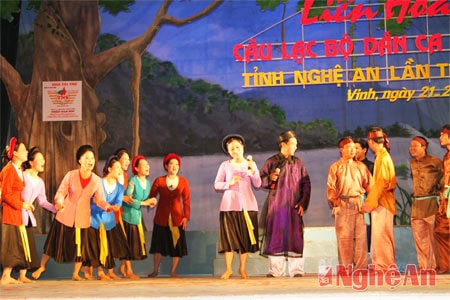Satirical laughter in the wallet, Nghe Tinh mile
(Baonghean) - In daily communication, Nghe people use Nghe accent, which means using a phonetic shell with a semantic value that is completely different from other localities. Therefore, Nghe language has a "purely" local vocabulary. These local specialties appear densely in vi and dam, becoming unique means of expression that show a natural, simple, but also very sophisticated and humorous way of thinking and feeling.
 |
| The Festival of Vi and Giam Folk Song Clubs is organized annually by Nghe An province. Photo: PV |
Nghe Tinh workers are very conscious of using local language to create laughter to relieve the hardships and fatigue after a day of work, to lessen the worries of a life of constant hunger and lack of clothing. One of the topics that Nghe Tinh folk authors use to create laughter is to exploit the defects and imperfections on a person's body.
For example: “My husband has pockmarked skin/Chún (legs) and trù (words) and bát mật (words) and thong manh (crossed eyes). The local words: rồ sut rù sì (very pockmarked, reduplicated word), chan (leg), trù (words), thong manh (crossed eyes) in the song are the highlights that the wife wants to introduce about her husband, introduced with laughter. The laughter here is just for fun, not to show criticism or sarcasm but to sympathize, share and accept. Or: Trốc khúc bằng dây giang/ La lan chi ơi mu (dam song). In the above dam song, the word mu is used to refer to an old woman, with the characteristic of trốc khúc bằng dây giang, meaning a thin, shriveled, lifeless person. The laughter here is not completely malicious, sarcastic, provocative but mainly creates joy. Laughter in the vi dam also has many different tones. There are laughs that mainly criticize and satirize bad habits and vices within the masses. Sometimes, laughter arises from the mismatch between appearance and inside, between form and content, between words and actions, between reality and unrealistic dreams,...
For example: The cow tra wants to eat young grass/ The old man wants to take the red paper, how can he bear it (vi song). The people of Nghe Tinh do not say "get a wife" but say "get a paper", do not say "husband and wife" but say "gây xung"; saying "gây son" is equivalent to the word "young wife" in the Vietnamese language. In the lyrics of the vi song, we see that the old man asking to take the red paper is a situation that is not in accordance with common sense. Perhaps, nowhere else is laughter as lively and rich as in the vi and dam songs of Nghe Tinh. There is the sarcastic laughter of the husband when introducing a character trait of the wife: "Bông bông vai vai chi" (what) em/ Haven't even gone to the market yet, already craving for the tough jackfruit/ While walking, I chew/ Out of two coins of candy (dam song); there is the sad laughter of a wife with a miserable fate: "My parents forced me to get married once/ Married a lazy husband who sleeps all day" (vi song); There are words of reproach due to carelessness: I (I) drifted home, drifted door/ You (you) don't (don't) look (care), then that's it (hat dam); there is sarcasm in the easygoing lifestyle: Just came to play for a meal/ Rice, wine, meat, and I was full/ Gave me a cake to take home/ Thought that was enough to make me happy... A series of local words: chi (what), sem (crave), tru (money), loac (lazy), ca ngay (all day), tau (me), cua (door), mi (you), no (don't), look (care), bua (meal), nga nghe (no say), cap (carry), rua (that), chom (happy) are used as a means of making people laugh, expressing an attitude of criticizing bad habits and vices in daily life. The purpose of laughter is to combine the need for entertainment with criticism and education to perfect human personality.
The laughter in the folk song also points to problems and situations arising in society. That is child marriage: The rice field is deep and the calf is plowed/ The wife is twenty-one and the husband is thirteen/ The wife is worried about the house/ The husband is begging and crying for his father (singing the folk song).
Nghe people say what they think, without any embellishment or fussiness in expression: Before, I said I love you/ I kept the areca nuts in the room/ I kept the betel leaves in the field/ The pigs were grunting in the pen/ Money was tied with ropes in the chest/ I had a carved bed ready in the room/ Now, I say I don't love you/ Why are you so heartless, Mu?/ Why are you so heartless, Mu? (hat dam). Along with a series of local words, the word Mu refers to a girl who betrays her marriage agreement.
And here is the girl's reproach: All these days, you've been playing, where (where)/ Planting lotus, you haven't gone down to the lake to visit the lotus (hat vi). The colloquial nature of Nghe Tinh's vi and dam is revealed through the dense use of local vocabulary. In the above vi song, the local words ngay nay (long time), choi (play), mo (where), no (not) are used very naturally, expressing the straightforwardness and frankness of Nghe Tinh people, saying what they think.
It can be said that Nghe Tinh's folk songs contain within them unique points of thinking, aesthetic views, good and evil, satirical laughter of a geographical area - people called Nghe. The satirical laughter in Nghe Tinh's folk songs is very diverse and rich: there is laughter to cheer up, there is laughter to educate, there is laughter to fight... all are established by the language and expression peculiar to the locality.
| RELATED NEWS |
|---|
TS.Nguyen Hoai Nguyen
(Vinh University)

.png)






